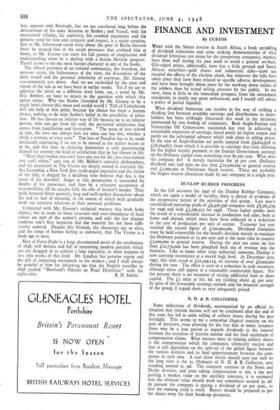FINANCE AND INVESTMENT
By CUSTOS
WHAT with the Smuts reverse in South Africa, a fresh sprinkling of dividend reductions and some striking demonstrations of what dividend limitation can mean for the prosperous companies, markets have done well during the past week to avoid a general set-back. Gilt-edged prices, admittedly, have lost a little ground and South African securities—gold shares and industrials alike—have not escaped the effects of the election shock, but wherever the falls have taken place they have been related to specific adverse developments and have been brought about more by the marking down tactics of the jobbers than by actual selling pressure by the public. In my view, there is little in the immediate prospect, from the investment standpoint, to justify any great enthusiasm, and I would still advise a policy of partial liquidity.
What dividend limitation can involve in the way of striking a dividing line between available earnings and distributions to share- holders has been strikingly illustrated this week in the decisions announced by two leading oil companies. Both Anglo-Iranian and Venezuelan Oil Concessions succeeded. last year in achieving a remarkable expansion of earnings, based partly on higher output and partly on the substantial advance which took place in selling prices. In the cak of Anglo-Iranian net profit jumped from £9,624,938 to £18,564,857, from which it is possible to calculate that even allowing for the higher royalty payment to the Iranian Government earnings on the Ordinary capital were something over fio per cent. What does the company do? It merely maintains the 30 per cent. Ordinary dividend rate and puts no less than £ro,5oo,00o to general reserve and Li,000,000 to Preference Stock reserve. These are probably the largest reserve allocations made by any company in a single year.
DUNLOP RUBBER PROGRESS
In the full accounts for 1947 of the Dunlop Rubber Company, which are again a model of lucidity, there is plenty of evidence of the progressive nature of the activities of this group. Last year's consolidated operating profit of £9,.6,396 compares with £8,263,279 for 1946 and with £3,566,312 for 1938. These higher profits were the result of a considerable increase in production and sales, both at home and abroad, which must have been reflected in a reduction in the cost of production per unit of output. Turnover last year reached the record figure of £102,000,000. Dividend limitation must be held responsible for the board's decision merely to maintain the Ordinary payment at 15 per cent and at the same time to transfer £2,000,000 to general reserve. During the past ten years no less than £21,75o,000 has been ploughed back out of revenue into the business. Like so many other large industrial concerns, Dunlop is now carrying inventories at a record high level. At December 31st, 1947, this item stood at £22,549,114, an increase of over £6,000p00 during the year. The effect is seen in a reduction in cash resources, although these still Appear at a reasonably comfortable figure. For the present there is no intention of raising additional loan or share capital. The £r units at 72s. 6d. are yielding about 4+ per cent. In spite of the favourable earnings outlook and the financial strength of the group, I regard them as very adequately priced.
N. H. & B. COLLIERIES
Some reductions of dividends, accompanied by an official in- timation that interim income will not be continued after the end of this year, has led to some selling of colliery shares during the past fortnight. This seems to me a somewhat illogical reaction on the part of investors, even allowing for the fact that in many instances there may be a lean period as regards dividends in the interval between the cessation of interim income and the final settlement of compensation claims. What matters most in valuing colliery shares is the compensation which the companies ultimately receive and that is still dependent on the split-up of the global figure between the various districts and its final apportionment between the com- panies in each area. A coal share which should turn out well on the long view is the is. Ordinary of N. H. & B. Collieries, now standing around 2s. 9d. The company operates in the Notts and Derby districts, and even taking compensation at 20s. a ton and putting a modest value on the ancillary interests, it is estimated that the ultimate value should work out somewhere around 3s. 9d. At present the company is paying a dividend of to per cent., so that the running yield is small. Buyers should be prepared to put the shares away for their break-up prospects.


































 Previous page
Previous page